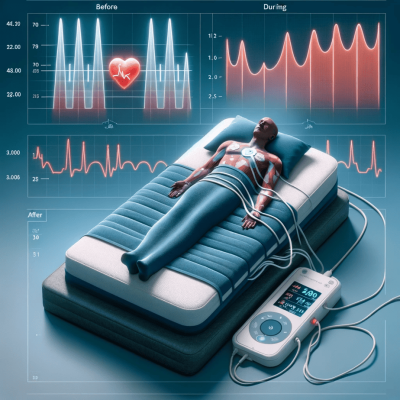In today?s news, a study published on Monday in the Journal of Epidemiology and Community Health found a small reduction in memory and cognitive skills when exercise was skipped in favor of less strenuous activities like sitting or lying down. According to a recent study, letting your middle grow can do more than just make you shop for bigger britches; it might also impair your physical capabilities as you age. Women are less likely to be satisfied with their health and well-being, according to a recent Collage Group study.
Table of Contents
ToggleStudy suggests sitting instead of exercising worsens brain function
Original Source: Skipping exercise in favor of sitting can worsen brain function, study finds
A study published Monday in the Journal of Epidemiology and Community Health found that skipping exercise in favor of sitting or lying down was connected to a small reduction in memory and reasoning.
According to lead study author John Mitchell, a researcher at the UK’s Institute of Sport, Exercise, and Health, even slight changes in physical activity can alter health, particularly brain health.
Mitchell and his colleagues examined data from the 1970 British Cohort Study, a long-term health study of British citizens born in 1970. The study used data from approximately 4,500 people followed from 2016 to 2018.
Participants disclosed their health, history, and lifestyle. They had to wear an activity tracker for at least 10 hours a day for seven days, even when sleeping and bathing.
The Department of Health and Human Services advises individuals to exercise 150 minutes a week, including two days of muscle-strengthening training.
Biswas said the cardiovascular system may explain the link between exercise and brain performance.
“When you’re active, you’re essentially enhancing the strength and ability of your heart to pump blood across your body and to one of the most vital organs: your brain,” he added.
Marc Roig, a McGill University physical and occupational therapy professor who was not involved in the current study, warned that not getting enough exercise can contribute to a variety of health problems, including dementia.
Roig noted that modest physical activity instead of more strenuous activity also decreased cognitive performance in the study.
He added scientists are still determining which workouts boost health and prevent chronic diseases.
According to research author Mitchell, light movement is still better than sitting.
“The jury is still out on what is a critical ?threshold’ intensity for optimal health, including cognitive health,” he said.
Participants were tested on information processing and recall.
Participants averaged 51 minutes of moderate or strenuous exercise, six hours of light activity like a gentle walk, and nine hours of sitting or lying down every day. They slept eight hours on average.
Mitchell said anything that got “the heart pumping” or made someone “feel warmer” was moderate to intensive activity in the study.
The researchers observed that skipping exercise for eight minutes of sedentary behavior decreased cognition scores by 1% to 2%.
Cognitive performance decreased similarly when persons replaced severe exercise with six minutes of modest physical activity or seven minutes of sleeping.
Conversely, exercising instead of sitting improved cognitive performance. The study indicated that nine minutes of strenuous exercise increased cognition scores by almost 1%.
Aviroop Biswas, assistant professor of epidemiology and associate scientist at the Institute for Work & Health in Toronto, said the findings should motivate individuals to walk more.
“Physical activity is associated to a broad array of advantages,” said Biswas, who wasn’t involved in the research.
Having a belly bulge can lead to subsequent physical decline, study says
Original source: Midriff bulge linked to later physical decline, study says
Look at your waist if you’re approaching 50. Leaning over to see your feet is common. Yes, the dreaded stomach bulge?that increasing waistline that can creep up on you as you age, like a receding hairline or wrinkles.
Tough to fight, it almost seems like a rite of passage, part of life, right? A new study discovered that letting your middle expand can affect your physical abilities later in life, not just your britches.
The study, which monitored 4,509 Norwegians 45 years or older for nearly two decades, revealed that those with high or moderately high waist circumferences at the start were 57% more likely to be “frail” than those with normal waistlines.
Frailty is not a “tottering” old person with a cane. Instead, frailty involves inadequate grip strength, sluggish walking pace, tiredness, unintended weight loss, and limited physical activity.
According to a study published in BMJ Open on January 23, 2023, people with a body mass index (BMI) of 30 or more at the start of the trial were 2.5 times more likely to be weak than those with a normal BMI (18.5 to 24.9).
Authors provide several causes. Study coauthor Shreeshti Uchai, a PhD research fellow in nutritional epidemiology at the University of Oslo in Troms?, Norway, and her colleagues noted that obesity increases fat cell inflammation, which damages muscle fibers and reduces muscular strength and function.
The scientists concluded that weight growth and waist circumference must be monitored and frailty broadened.
?In the environment where the population is rapidly ageing and the obesity epidemic is rising, accumulating evidence recognises the subgroup of ?fat and frail’ older persons in contrast to frailty merely as a wasting disorder,? they wrote.
Fight decline
Exercise can reduce aging-related weakness. According to the US Department of Health and Human Services’ physical activity guidelines for Americans, adults should exercise at least two or more days a week at a moderate level and strengthen all major muscle groups.
Dr. Nieca Goldberg, the medical director of Atria New York City and clinical associate professor of medicine at New York University’s Grossman School of Medicine, told CNN that reducing body fat and increasing lean muscle can enhance balance and posture.
Do aerobics and strength training to keep healthy.
Dr. William Roberts, a University of Minnesota Medical School family medicine and community health professor, said they “appear to interact together and support each other advance toward better outcomes.” “A balanced program of strength and aerobic activity is probably optimal and probably more closely replicates the behaviors of our ancestors, which helped determine our current gene sets.”
Dana Santas, a professional sports mind-body coach and CNN fitness expert, recommends starting with body-weight workouts before moving on to free weights.
CNN’s Fitness, But Better email series, a seven-part expert-backed guide, will help you ease into a healthy routine.
A study reveals that women have trouble prioritizing their health
Original source: Women struggle to put health needs first, study finds
According to a Collage Group report released this week, geopolitical situations, social expectations, and family responsibilities make it hard for women to prioritize their health.
43% of polled women were satisfied with their physical condition, and only 33% with their financial situation. 35% of women exercised regularly, compared to 46% of males, according to the research.
The survey examined three primary variables that make it tougher for women to prioritize their heath and obtain treatment.
The study first identifies sociopolitical factors that hinder women’s healthcare, such as abortion bans. Women get 83 cents for every dollar men earn.
Second, gender preconceptions, biases, and social expectations sometimes impede women from focusing on their health or seeking the care they need.
Finally, caring for others and handling most home tasks puts women under pressure and makes them put their health last.
The survey also revealed that women use various “self-care” activities including drinking enough water, taking supplements, and eating a balanced diet to improve their health.
50% of women were satisfied with their emotional health, compared to 59% of males. Women also rated their physical and financial wellbeing lower than men.
The authors claimed that women are dissatisfied with their health despite taking a proactive and conscientious approach. ?Women are busy. The expectation to put others first while taking on most home tasks and structural economic inequity hinder their ability to maintain their own health and well-being.?
WPP and SeeHer found that nearly half of women think media and advertising ignore women’s health issues.
The Collage Group analysis suggests numerous reasons why women are less satisfied than males.
First, they may set greater health standards. Women surveyed claimed “being healthy” includes being mentally well, free of illness, stress, and well-rested. Time constraints may make these items tougher to achieve.
54% of women are caregivers, and 33% care for sick children. According to the report, 48% of women carers spend more time than 42% of men on daily caregiving.
The survey found that money is the main reason women don’t get enough care. However, feeling overloaded with job, domestic tasks, and caretaking makes it harder for women to stay committed to self-care.
Collage Group suggests giving women practical resources including reminders for checks and annual screenings, recommendations on saving money on healthcare, telehealth, and healthy eating advice.
Transparent communication?including regarding “taboo” health topics like aging, birth control, and mental health?can also boost women’s trust in healthcare providers.
Summary of today?s physical health news
Overall, according to a study published Monday in the Journal of Epidemiology and Community Health, skipping exercise in favor of less demanding activities like sitting or lying down was connected to a modest deterioration in memory and reasoning. From 2016 to 2018, roughly 4,500 patients were followed up with for the study. After reviewing the individuals’ activity data, the researchers found that those who skipped exercise for eight minutes of sedentary behavior had 1% to 2% lower cognition ratings. Exercise improved cognitive performance, too. According to the study, nine minutes of strenuous exercise increased cognition scores by more than 1%.
Furthermore, a study indicated that participants with a high or moderately high waist circumference at the beginning of the trial were 57% more likely to be “frail” than those with a normal waistline. The study followed 4,509 adults in Norway who were 45 years of age or older for almost two decades. The findings emphasize the necessity of monitoring both total weight gain and any increase in waist circumference, as well as the need to widen the definition of frailty, the authors wrote. Try to combine strength and aerobic activities to maintain your strength and health.
Finally, according to a research issued this week by the Collage Group, women frequently struggle to prioritize their health requirements when confronted with geopolitical circumstances, social expectations, and domestic responsibilities. Less than one-third of the women polled indicated they were content with their present financial status, and only 43% said they were satisfied with their physical health. The study also discovered that women typically get less regular exercise and sleep than men, with only 35% of women reporting regular activity compared to 46% of males.








